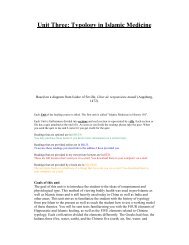Beginning Iridology Guide - Weebly
Beginning Iridology Guide - Weebly
Beginning Iridology Guide - Weebly
Create successful ePaper yourself
Turn your PDF publications into a flip-book with our unique Google optimized e-Paper software.
Alcoholic Fermentation<br />
depends on--<br />
(1) A watery solution corresponding to<br />
(2) Sugar, corresponding to<br />
(3) Yeast, corresponding to<br />
Feverish and Inflammatory Diseases<br />
depend on--<br />
(1) Living blood and tissues.<br />
(2) Waste and morbid matter in the blood.<br />
(3) Microzyma, bacteria and parasites in blood and<br />
tissues.<br />
The following may serve as an explanation of the preceding diagram. Modern<br />
allopathic materia medica is founded largely on the assumption that bacteria and<br />
parasites of their own accord create disease conditions. From this they draw the<br />
natural conclusion that to kill the germs is equivalent to curing the disease. Almost<br />
their entire therapeutic efforts are directed to discovering, killing and eliminating by<br />
poisonous drugs, serums, antitoxins and by the surgeon's knife, the bacteria and<br />
parasites of disease.<br />
The following demonstrations, however, will prove that the primary assumption of<br />
allopathy, as well as its resulting conclusions, are fallacious and that a practice built<br />
on these false foundations must of necessity be pregnant with disastrous results.<br />
First or Hereditary Stage of Disease<br />
Fermentation Inflammation<br />
Water plus a sugar solution (grape juice)<br />
corresponds to<br />
A body plus hereditary and acquired morbid<br />
matter.<br />
Second or Acute Inflammatory Stage of Disease<br />
Fermentation Inflammation<br />
Yeast lives on sugar plus some proteid. While<br />
feeding on these, the yeast germ digests or splits<br />
up the sugar into alcohol and carbonic acid gas.<br />
Disintegration of the sugar molecules is<br />
accompanied by the liberation of heat and by<br />
accelerated atomic motion. The temperature rises<br />
perceptibly, bubbles of carbonic acid gas and a<br />
scum consisting of dead and live yeast germs and<br />
of other debris rises to the surface. Processes of<br />
fermentation are in many respects identical with<br />
processes of digestion, combustion or oxidation.<br />
The entire fermenting fluid is in violent<br />
commotion.<br />
If fermentation is allowed to run its natural<br />
course, within certain limitations of temperature,<br />
until all sugar in the fluid is consumed, the process<br />
ceases of its own accord, chemical activity and<br />
temperature subside, and the resulting product is a<br />
wine-like fluid of crystal clearness.<br />
Alcohol, while itself the product of fermentation,<br />
as it accumulates in the fluid, checks fermentation.<br />
Microzyma, while feeding on morbid matter,<br />
develop into bacteria or germs of putrefaction, and<br />
these in turn while feeding on pathogenic<br />
materials decompose them into simpler<br />
compounds suitable for neutralization and<br />
elimination. The resulting ashes or debris (see<br />
yeast scum) are eliminated through the natural<br />
channels of depuration and in the forms of pus,<br />
catarrhal and other morbid discharges. These<br />
processes of combustion and elimination of<br />
disease matter are usually termed fevers,<br />
inflammations, boils, abscesses, etc. Like<br />
fermentation they are accompanied by rise in<br />
temperature, accelerated (motion) pulse,<br />
elimination of effete matter, etc.<br />
If the acute inflammatory processes in the body<br />
are allowed to run their natural course, within<br />
certain limitations of temperature until all morbid<br />
matter is consumed and eliminated, the result is a<br />
cleaner, healthier body. (Fever can be easily<br />
controlled within safe limits by cold water<br />
applications, fasting, etc.)




